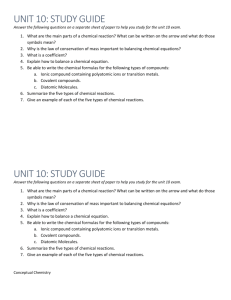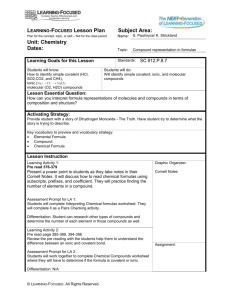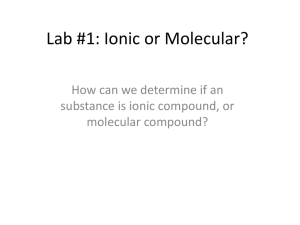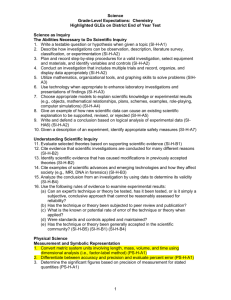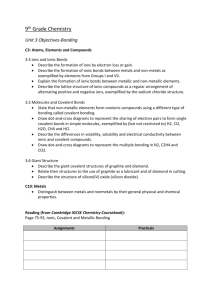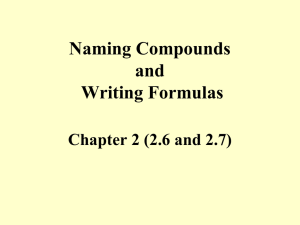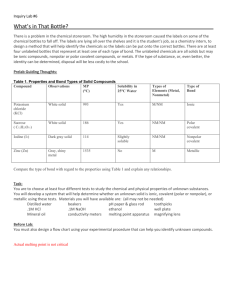honors chemistry - unit four bonding monday tuesday wednesday 2
advertisement
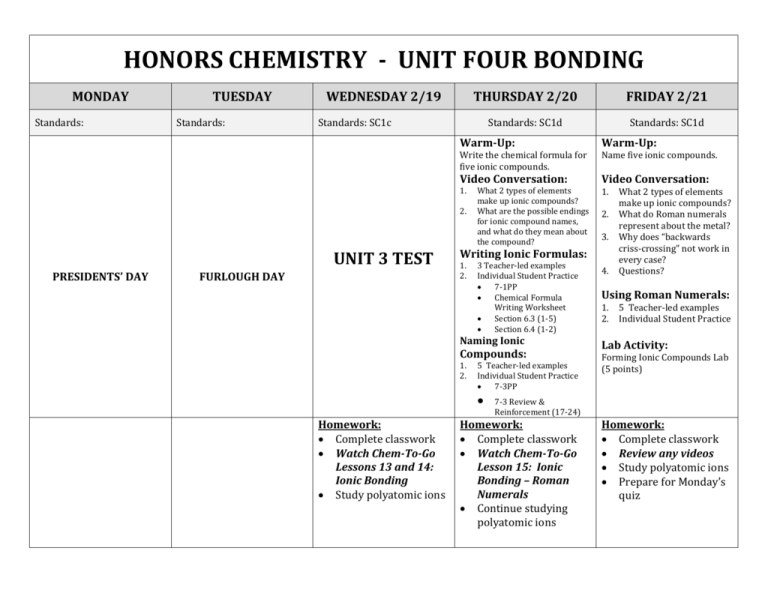
HONORS CHEMISTRY - UNIT FOUR BONDING MONDAY Standards: TUESDAY Standards: WEDNESDAY 2/19 THURSDAY 2/20 FRIDAY 2/21 Standards: SC1d Standards: SC1d Standards: SC1c Warm-Up: Warm-Up: Video Conversation: Video Conversation: Write the chemical formula for five ionic compounds. 1. 2. UNIT 3 TEST PRESIDENTS’ DAY FURLOUGH DAY What 2 types of elements make up ionic compounds? What are the possible endings for ionic compound names, and what do they mean about the compound? 1. 2. 3. Writing Ionic Formulas: 1. 2. 3 Teacher-led examples Individual Student Practice 7-1PP Chemical Formula Writing Worksheet Section 6.3 (1-5) Section 6.4 (1-2) Naming Ionic Compounds: 1. 2. 5 Teacher-led examples Individual Student Practice 7-3PP Homework: Complete classwork Watch Chem-To-Go Lessons 13 and 14: Ionic Bonding Study polyatomic ions Name five ionic compounds. 4. What 2 types of elements make up ionic compounds? What do Roman numerals represent about the metal? Why does “backwards criss-crossing” not work in every case? Questions? Using Roman Numerals: 1. 2. 5 Teacher-led examples Individual Student Practice Lab Activity: Forming Ionic Compounds Lab (5 points) 7-3 Review & Reinforcement (17-24) Homework: Complete classwork Watch Chem-To-Go Lesson 15: Ionic Bonding – Roman Numerals Continue studying polyatomic ions Homework: Complete classwork Review any videos Study polyatomic ions Prepare for Monday’s quiz MONDAY 2/24 TUESDAY 2/25 WEDNESDAY 2/26 THURSDAY 2/27 FRIDAY 2/28 Standards: SC1d Standards: SC1d Standards: SC1d Standards: SC1d Standards: SC1d Warm-Up: Write names and formulas for five ionic compounds. Quiz: Writing Formulas and Names for Ionic Compounds (20 points) VIDEO LESSON: ChemTo-Go Lesson 16: Covalent Bonding Formulas & Names SMALL GROUP: Writing Covalent Formulas and Names 1. 2. Teacher-led examples Individual Student Practice Chemical Formula Writing and Naming Write Formulas for 7-3 PP Cont’d INDIVIDUAL: Answer 5 short questions using your notes. Homework: Complete classwork Review Lesson 16 video if needed. Warm-Up: Write names and formulas for five covalent compounds. VIDEO LESSON: ChemTo-Go Lesson 17: Covalent Bonding-Lewis Dot Structures SMALL GROUP: Drawing Lewis Dot Structures 1. 2. Teacher-led examples Individual Student Practice INDIVIDUAL: Answer 5 short questions using your notes. Warm-Up: Write names and formulas for five compounds. Can you differentiate ionic from covalent? VIDEO LESSON: ChemTo-Go Lesson 18: Covalent BondingPolarity & Intermolecular Forces SMALL GROUP: Drawing Lewis Dot Structures - Predicting Polarity & Intermolecular Forces 1. 2. Teacher-led examples Individual Student Practice Warm-Up: Quiz: Writing Formulas and Putting Covalent Concepts together: Video Conversation: Write formulas, name compounds, and draw Lewis Dot structures with a partner. 1. 2. Teacher-led examples Predict polarity and shape of each. INDIVIDUAL: 1. 2. 3. 4. Draw assigned compounds. Predict polarity. Predict intermolecular forces. Predict a few physical properties that result from the forces. 2. 3. Name the five molecular shapes that you need to know. What’s the difference between tetrahedral and bent? Questions? VSEPR Modeling Lab: 3. 4. 5. 1 Teacher-led examples Build each molecule and receive teacher approval. Predict polarity and shape of each. Begin Bonding Webquest Review short questions using your notes. Homework: Complete classwork Review Lesson 18 video if needed. 1. Self-Evaluation: INDIVIDUAL: Answer 5 Homework: Complete classwork Review Lesson 17 video if needed. Names for Covalent Compounds and Acids (20 points) Homework: Complete classwork Watch Chem-To-Go Lesson 19: Covalent Bonding – VSEPR Theory Homework: Complete Bonding Webquest Review Review any or all videos. MONDAY 3/3 TUESDAY 3/4 WEDNESDAY 3/5 Standards: SC1d Standards: SC1b, c, d Standards: SC1b, c, d Return yesterday’s quiz: Unit Four Test Quiz: Writing Formulas and Names for Ionic Compounds, Covalent Compounds and Acids (20 points) Properties of Compounds Lab: 1. Teacher-led example 2. Test 3 samples in the lab. Homework: Review webquest Review any or all videos. Writing Formulas and Names for Ionic Compounds, Covalent Compounds and Acids (20 points) Unit Four Lab Practical Unit Three Cumulative Quiz Homework: Review webquest Review any or all videos. THURSDAY FRIDAY
